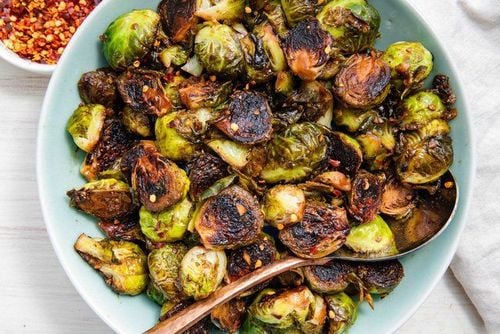This is an automatically translated article.
Brussels sprouts are a member of the Brassicaceae family and are closely related to kale, cauliflower and broccoli. Brussels sprouts are packed with nutrients and offer a number of health benefits.
1. Some general information about Brussels sprouts
Brussels sprouts are named after the capital city of Brussels (Belgium), where it is believed that they were first widely grown in the 16th century. Sometimes they are also called mini cabbage, this type of cabbage is usually appeared on the "most hated vegetable" list because of its potential bitter taste caused by sulfur-containing compounds.
Overcooking vegetables, especially by boiling, will increase bitterness and unpleasant odors. However, when cooked and seasoned properly, Brussels sprouts provide a healthy, natural sweetness.
2. Nutritional composition of Brussels sprouts
Brussels sprouts are rich in vitamins, fiber and minerals. In 78 grams of cooked Brussels sprouts contains the following nutrients:
Calories: 28 Protein: 2 grams Carbs: 6 grams Fiber: 2 grams Vitamin K: 137% RDI Vitamin C: 81% RDI Vitamin A: 12 RDI Folate (B9): 12% RDI Manganese: 9% RDI

Bắp cải Brussels là nguồn thực phẩm giàu vitamin, chất xơ và khoáng chất.
3. Health benefits of Brussels sprouts
Brussels sprouts belong to the Brassica Oleracea family of cruciferous vegetables, including broccoli, cauliflower, cabbage, kale and collard greens. Cruciferous vegetables contain sulfur-containing glucosinolates, which give them their distinctive odor and bitter taste. Cooking and digestion break down glucosinolates into isothiocyanates compounds that have been studied for their anti-cancer effects, such as protecting cells from DNA damage and preventing new blood vessels from growing in cells. tumor.
However, there is no direct evidence that Brussels sprouts have anti-cancer effects in humans, and some evidence suggests they may increase the risk of pancreatic cancer. While we wait for more evidence, we should eat Brussels sprouts no more than once a week, changing the diet with more cruciferous vegetables such as cabbage and cauliflower. In addition, Brussels sprouts are high in fiber, which supports digestive health and reduces the risk of heart disease and diabetes.
4. Some ways to prepare Brussels sprouts
You should choose Brussels sprouts that are bright green with tightly packed leaves. Yellow or wilted leaves are a sign of aging and decaying wealth. This vegetable can be stored for 3 to 5 weeks in the freezer, and about 1 to 2 weeks in the refrigerator. Older Brussels sprouts also tend to produce a stronger odor. Rinse the Brussels sprouts under running water to remove any dirt, cut off the hard stems underneath and remove the discolored outer leaves.
Có rất nhiều cách khác nhau để chế biến cải Brussels.
There are several ways to prepare Brussels sprouts:
Grilling: Cut the Brussels sprouts in half and lay the cut sides in a single layer on a parchment-lined baking tray, add a pinch of salt and olive oil. Bake in the preheated oven until golden on the outside and tender on the inside. Steaming: You can make steamed cabbage by placing the cleaned and trimmed Brussels sprouts in the steaming basket and inserting it into the pot. Then, turn the heat to medium, cover the pot and let cook for 6-8 minutes or until the cabbage is tender. Allow the steam to escape by opening the lid after a few minutes to release the strong sulfur compounds. Shredded: Cut the Brussels sprouts in half lengthwise. With the cut side, cut into thin slices and then use your fingers to separate the leaves into small strands. They can be used in a Brussels sprout salad or a quick stir-fry with a dash of olive oil.
Please dial HOTLINE for more information or register for an appointment HERE. Download MyVinmec app to make appointments faster and to manage your bookings easily.
REFERENCES: hsph.harvard.edu












